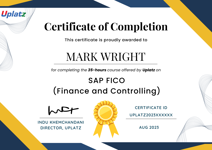
IT Support Engineer Career Path
Self-paced videos, Lifetime access, Study material, Certification prep, Technical support, Course Completion Certificate
Uplatz
Summary
- Uplatz Certificate of Completion - Free
Add to basket or enquire
Overview
Uplatz offers in-depth and extensive Career Path program on IT Support Engineer. This is video-based program consisting of recorded lectures on topics associated with IT & technology support. You will be awarded Course Completion Certificate at the end of the course.
IT Support Engineer career path consists of courses that will lead you to a fulfilling career in the IT support area. The key courses included are:
- ServiceNow
- Introduction to DevOps
- Introduction to Unix and Linux
- Unix and Linux File Utilities
- Linux Utilities
- Linux System Administration
- Shell Programming
- Introduction to Cloud Computing
- Microsoft Excel
- Google Sheets
- Project Management Fundamentals
- Microsoft Project
- PRINCE2 Fundamentals
- Product Management
- Computer Hardware Engineering
- Business Intelligence for Beginners
- CISSP (Cybersecurity)
An IT Support Engineer is a professional responsible for providing technical assistance and support to end-users and organizations in managing their computer systems, hardware, software, and network infrastructure. They play a crucial role in ensuring that technology functions smoothly and efficiently, addressing technical issues, and resolving problems to minimize downtime and disruptions.
Here are some key responsibilities and tasks typically associated with the role of an IT Support Engineer:
User Support: Respond to and resolve user inquiries and technical issues via phone, email, or in person. This includes problems with hardware, software, applications, and network connectivity.
Troubleshooting: Identify and diagnose hardware and software problems, determining the root cause of technical issues, and finding appropriate solutions.
Installation and Configuration: Install, configure, and maintain computer hardware, operating systems, and software applications for end-users.
Network Support: Assist in setting up and maintaining local area networks (LANs) and troubleshoot network connectivity issues.
Security: Implement security measures to protect systems and data from potential threats and ensure compliance with security policies.
Updates and Upgrades: Perform system updates, software patches, and hardware upgrades to improve system performance and security.
Data Backup and Recovery: Regularly back up data and develop contingency plans for data recovery in case of system failures or disasters.
Documentation: Maintain accurate records of technical issues, resolutions, and system configurations. Create and update technical documentation for end-users and colleagues.
Remote Support: Provide remote assistance to users and troubleshoot issues on off-site systems.
Hardware Maintenance: Maintain and repair computer hardware, including desktops, laptops, printers, and peripherals.
Training: Conduct training sessions to help users understand technology tools and improve their technical skills.
Continuous Learning: Stay up-to-date with the latest technology trends, software updates, and industry best practices.
To excel as an IT Support Engineer, you should possess strong technical knowledge, problem-solving skills, and effective communication abilities. Patience, customer service orientation, and the ability to work well under pressure are also essential qualities in this role. Additionally, IT Support Engineers may work in-house for a single organization or be part of an IT support team in an IT services company, serving multiple clients. The specific tasks and responsibilities can vary depending on the size and nature of the organization they work for.
Course media
Description
IT Support Engineer career path and the various stages that professionals can go through as they progress in their careers:
Entry-Level IT Support Specialist: This is the starting point for many IT Support Engineers. They handle basic user inquiries, troubleshoot common technical issues, and assist in setting up computer systems and software for end-users. Entry-level support specialists gain foundational knowledge in hardware, software, and basic network troubleshooting.
Junior IT Support Engineer: With experience and further training, IT Support Specialists can advance to the junior level. They take on more complex technical challenges, handle escalated issues, and participate in more significant projects. They may also begin to specialize in specific areas of IT support, such as hardware maintenance, software deployment, or user training.
Mid-Level IT Support Engineer: At this stage, professionals typically become well-rounded in various IT support tasks and take on more responsibility. They may start leading small teams, work closely with other IT departments, and participate in IT infrastructure planning and implementation. Mid-level engineers often have a deeper understanding of networking and server administration.
Senior IT Support Engineer: Senior IT Support Engineers have extensive experience and expertise in managing complex IT environments. They act as mentors for junior team members, handle critical incidents and problems, and design and implement IT support processes and best practices. Senior engineers may also work on IT projects that impact the entire organization.
IT Manager or IT Team Lead: Some IT Support Engineers may choose to transition into leadership roles. IT Managers or Team Leads oversee IT support teams, handle resource management, set strategic goals, and collaborate with other departments to align IT initiatives with the organization's objectives. Leadership roles focus on both technical and managerial skills.
Specializations: As IT Support Engineers gain experience, they might opt to specialize in specific areas, such as:
- Network Security Specialist: Focusing on network security, firewall configurations, intrusion detection/prevention, and vulnerability assessments.
- Cloud Solutions Architect: Specializing in cloud technologies, migrating systems to the cloud, and managing cloud-based infrastructure.
- System Administrator: Becoming experts in server administration, managing operating systems, and ensuring high availability and performance.
Continuing education, obtaining industry certifications (e.g., CompTIA A+, Microsoft Certified Solutions Associate (MCSA), Cisco Certified Network Associate (CCNA), etc.), and staying up-to-date with the latest technology trends are crucial for career advancement in the IT Support Engineer path.
The IT Support Engineer career path provides ample opportunities for growth, from starting as a support specialist to progressing into leadership roles or specialized areas of IT support. Success in this field relies on a combination of technical proficiency, problem-solving capabilities, effective communication, and a willingness to adapt to the ever-evolving IT landscape.
Who is this course for?
Everyone
Requirements
Passion and determination to achieve your goals!
Career path
- IT Support Specialist
- IT Manager
- DevOps Engineer
- Server/System Administrator
- IT Support Engineer
- System Operator
- Application Support Engineer
- Network Security Specialist
Questions and answers
Currently there are no Q&As for this course. Be the first to ask a question.
Certificates
Uplatz Certificate of Completion
Digital certificate - Included
Course Completion Certificate by Uplatz
Reviews
Currently there are no reviews for this course. Be the first to leave a review.
Legal information
This course is advertised on reed.co.uk by the Course Provider, whose terms and conditions apply. Purchases are made directly from the Course Provider, and as such, content and materials are supplied by the Course Provider directly. Reed is acting as agent and not reseller in relation to this course. Reed's only responsibility is to facilitate your payment for the course. It is your responsibility to review and agree to the Course Provider's terms and conditions and satisfy yourself as to the suitability of the course you intend to purchase. Reed will not have any responsibility for the content of the course and/or associated materials.



